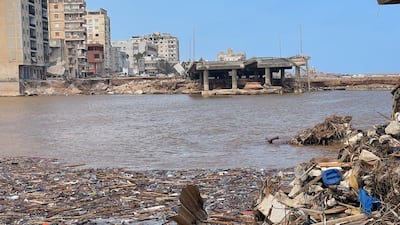Libyan authorities have warned that bacterial contamination has been detected in all groundwater and seawater sources in the eastern port city of Derna, after sewerage systems were destroyed in the devastating September 10 floods.
A gruesome continuing challenge is the presence of decomposing bodies of victims that are still washing up on the shore.
The Libyan Government of National Unity (GNU) said authorities from the Environmental Sanitation Affairs office detected the contamination following analyses of water samples in the past week.
"Our teams continue to inspect the water sources in the affected cities by conducting comprehensive analyses of the water samples, including those from the pipeline that draws seawater to the desalination plant connecting to the Derna port basin area," authorities said.
Following the flood on September 10, when Storm Daniel made landfall and caused widespread destruction, health experts have been warning of the danger of water contamination and waterborne diseases.
Tens of thousands of residents have been left homeless and are lacking clean water, food and basic supplies amid a growing risk of cholera, diarrhoea, dehydration and malnutrition, UN agencies have also warned.
In the latest toll announced by the eastern authorities as of Wednesday, at least 3,893 people have been confirmed dead in the disaster. International aid groups have said 10,000 or more people may be missing or feared dead.
Hafez Obeid, the head of the Libyan forensic team in charge of handling the bodies of victims found in Derna, said the salinity of the water helps to preserve bodies, making the identification process easier than for corpses found on land.
“The issue right now is not much of the corpses that are being found in the sea but more so those found in land,” Mr Obeid told The National from Derna.
"We’re equipped with full PPC (personnal protective clothing) and equipment to deal with the bodies but the issue of disease is more concerning when it comes to those bodies that have been lying under the rubble. Mix that with the broken sewage systems and the mud, and there’s a legitimate concern for health right now.”
Water supply
Survivors of the Derna flood in the main city, as well as those residents living in neighbouring villages, said they have been concerned with the water supply that is connected with the desalination pipe from the Mediterranean Sea.
The main pipe is considered an essential part of the seawater desalination process in the city, responsible for providing fresh water to Derna and its surrounding areas, the Environmental Sanitation Affairs office said.

“It is expected that the analysis process will continue for several weeks, as water samples will be collected from various water sources and analysed in specialised laboratories, and appropriate measures will be taken based on the results of the analyses and the recommendations of experts,” the authority said.
During the storm, water surging down the steep and narrow Derna Valley had been contaminated from debris and rubble, from poor building structures that collapsed during the disaster.
The World Health Organisation (WHO) says contaminated water is linked to the transmission of diseases like cholera, diarrhoea, dysentery, hepatitis A, typhoid and polio.

Residents said for the past week, they have continued to depend solely on bottled drinking water that has been pouring in from neighbouring cities and international aid teams.
"For now there’s some tap water access in some of the undestroyed homes closer to the outskirts away from the city centre but we’re even afraid of taking showers because we know that the water supply from the desalination plant has been compromised," Mahmoud Al Sheikh said.
Over the past week, a United Nations inter-agency team assessed the affected areas and said that over 35,000 people displaced by the floods are currently residing in overcrowded camps and settlements in Derna province, where they have limited access to clean water and sanitation.
"The environmental situation remains challenging with the proliferation of disease vectors such as flies and mosquitoes. Stagnant water, particularly in Al Makhili, Derna and Soussa, is a breeding ground for mosquitoes and creates conditions conducive to the spread of malaria and waterborne diseases," the World Health Organisation said.


